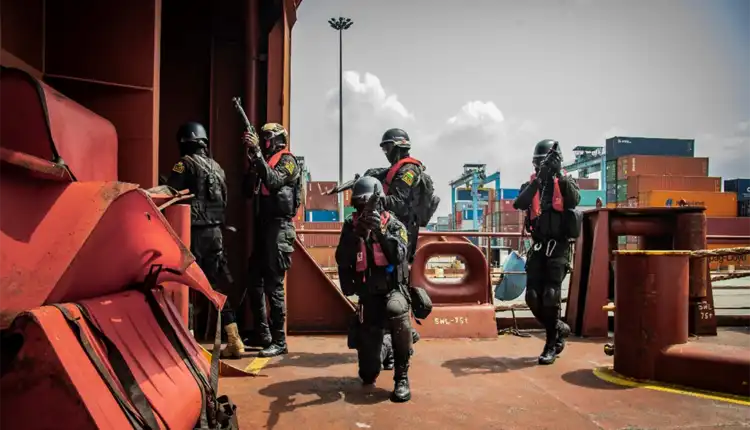Ghana Navy’s elite Special Boat Squadron and 64th Infantry Regiment conducted annual training exercises with U.S. and Danish militaries, designed to strengthen Ghana’s marine security, build its ability to defend its territorial waters, and coordinate more closely with its neighbors.
The training involved assault drill and others, such as close-quarter combat and emergency medical training.
“The tripartite collaboration between U.S., Denmark and Ghana has tremendously improved the capacity of the Ghana Navy SBS mainly in providing swift and effective response to maritime security incidents in Ghana’s coastal waters,” Ghana Navy Lt. Cdr. Seth Anthony Dzakpasu told African Defence Forum – a US funded media.
The SBS started in 2016 with the help of Nigerian Special Forces. Today, it operates a variety of vessels, including fast patrol crafts, within Ghana’s 200 nautical mile exclusive economic zone. It also works with Ghana’s Air Force, as it did during the recent training mission, to insert troops quickly when necessary, Dzakpasu said.
The JCET program’s primary purpose is to provide special operations units specific training that can only be accomplished in friendly foreign countries. JCETs often enhance U.S. relationships with partner nations by developing and maintaining critical military-to-military connections and improving joint and allied readiness and interoperability.
Dzakpasu noted that training missions such as the Joint Combined Exchange Program with the U.S. and Denmark have helped advance the capacity of Ghana’s developing SBS force.
The collaboration not only has enabled the SBS to learn best practices from the special operations force community, he added, but it has enabled the SBS to refine its training with the experience of the Danish Navy’s Frogman Corps special forces and U.S. partners.
“In all, the operational readiness of the SBS has greatly improved in just about one year of this training collaboration,” Dzakpasu said.
Through its partnership with the U.S. and Denmark, the Ghana Navy SBS has better capacity and greater efficiency to conduct anti-piracy operations, counterterrorism work, coastal reconnaissance and can safeguard strategic maritime infrastructure, Dzakpasu said.
By working closely with Nigeria and its other neighbors, Ghana can project more authority in the waters off the shared coast, particularly when crimes cross international boundaries.
“This gives us in the Gulf of Guinea a robust posture to fight maritime crimes,” Dzakpasu said.
In March, Special Operations Command Africa forces concluded a separate Joint Combined Exercise Training in Bundase, Ghana, in March. The team partnered with members of the Ghanaian 64th Infantry Regiment to hone special operations skills.
According to AFRICOM, yhese engagements are part of a series of U.S. engagements with the Ghanaian military that provide opportunities for units to work together, learn from each other, build interoperability, and strengthen relationships.
The mutual military exchanges demonstrate the collaborative partnership between the two nations and shared objective to enhance security in West Africa. U.S. forces remain committed to their partnership with Ghana as they defend against incoming threats from violent extremists.
